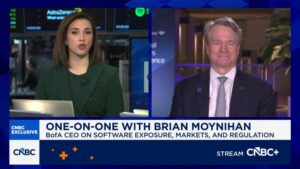I think these FTSE 100 shares might fall through the floor next year. Here’s why.
Lloyds Banking Group
The Lloyds (LSE:LLOY) share price has risen an impressive 34% during the past year. While investors are toasting these strong gains, I fear that the bank‘s stratospheric rise is unwarranted, and that it’s in danger of a correction before too long.
For one, it faces a prolonged period of weak earnings growth, plagued by low levels of lending and further loan impairments. This reflects the poor outlook for the UK economy and the bank’s lack of overseas exposure.
I also fear that expected interest rate cuts will damage Lloyds’ bottom line. While Bank of England actions would boost the economy, they would also sap the banks’ net interest margins (NIM), a critical gauge of profitability.
The biggest threat to the Lloyds share price, however, could be from the Financial Conduct Authority’s (FCA) probe into the mis-selling of car loans. The Black Horse Bank is a major motor finance supplier, and has set aside £450m to cover possible penalties associated with ‘secret’ commissions between lenders and car retailers.
This may be nowhere near enough, however. RBC Capital believes Lloyds may have to pay £3.2bn, up from the £2.5bn the broker had previously forecast.
As a result, RBC also thinks the bank may have to halve share buybacks planned for next year, to £1bn. If this begins to look likely, and indeed if broader news flow around the investigation worsens, then Lloyds’ share price could plummet.
The FTSE firm has one of the strongest banking brands out there. This in turn could help it to grow profits even as the domestic economy struggles.
But on balance, I think the firm carries far too much risk right now.
BP
Oil majors like BP (LSE:BP.) also face tough conditions in 2025 that could damage their share prices. More specifically, they could endure a sharp fall in energy prices as supply and demand pressures mount.
Things are looking gloomy as the OPEC+ cartel prepares to raise production, demand for renewable energy climbs, and crude shipments to China continue to lag.
Both OPEC and the Energy Information Adminstration (EIA) have cut their demand forecasts recently. And a fresh Reuters poll shows that experts think Brent crude will average $80.55 per barrel in 2024 and $76.61 next year. Both are downgrades from earlier estimates.
An escalation in the Middle East conflict could well push prices past these forecasts. But on balance, the picture is pretty bleak for oil values. And this is especially problematic for BP given its poor refining margins.
BP’s struggle to reduce its $24bn net debt pile is another big threat to its share price. Given the poor outlook for oil prices and the firm’s cash-sapping operations, this could have big consequences for future share buybacks and dividends.
This post was originally published on Motley Fool







